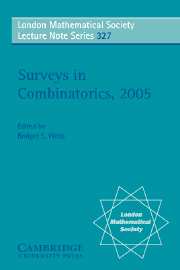Book contents
- Frontmatter
- Contents
- Preface
- 1 Finite field models in additive combinatorics
- 2 The subgroup structure of finite classical groups in terms of geometric configurations
- 3 Constructing combinatorial objects via cliques
- 4 Flocks of circle planes
- 5 Judicious partitions and related problems
- 6 An isoperimetric method for the small sumset problem
- 7 The structure of claw-free graphs
- 8 The multivariate Tutte polynomial (alias Potts model) for graphs and matroids
- 9 The sparse regularity lemma and its applications
5 - Judicious partitions and related problems
Published online by Cambridge University Press: 04 August 2010
- Frontmatter
- Contents
- Preface
- 1 Finite field models in additive combinatorics
- 2 The subgroup structure of finite classical groups in terms of geometric configurations
- 3 Constructing combinatorial objects via cliques
- 4 Flocks of circle planes
- 5 Judicious partitions and related problems
- 6 An isoperimetric method for the small sumset problem
- 7 The structure of claw-free graphs
- 8 The multivariate Tutte polynomial (alias Potts model) for graphs and matroids
- 9 The sparse regularity lemma and its applications
Summary
Abstract
Many classical partitioning problems in combinatorics ask for a single quantity to be maximized or minimized over a set of partitions of a combinatorial object. For instance, Max Cut asks for the largest bipartite subgraph of a graph G, while Min Bisection asks for the minimum size of a cut into two equal pieces.
In judicious partitioning problems, we seek to maximize or minimize a number of quantities simultaneously. For instance, given a graph G with m edges, we can ask for the smallest f(m) such that G must have a bipartition in which each vertex class contains at most f(m) edges.
In this survey, we discuss recent extremal results on a variety of questions concerning judicious partitions, and related problems such as Max Cut.
Introduction
A wide variety of combinatorial optimization problems ask for an “optimal” partition of the vertex set of a graph or hypergraph. A good example is the Max Cut problem: given a graph G, what is the maximum of e(V1, V2) over partitions V(G) = V1 ∪ V2, where e(V1, V2) is the number of edges between V1 and V2? Similarly, Min Bisection asks for the minimum of e(V1, V2) over partitions V(G) = V1 ∪ V2 with |V1| ≤ |V2| ≤ |V1| + 1 (there are k-partite versions Max k-Cut and Min k-Section of both problems).
Both of these problems involve maximizing or minimizing a single quantity over graphs from a certain class.
- Type
- Chapter
- Information
- Surveys in Combinatorics 2005 , pp. 95 - 118Publisher: Cambridge University PressPrint publication year: 2005
- 11
- Cited by

